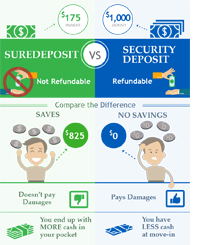3 Ways SureDeposit is Different than a
Security Deposit
The security deposit – not the most pleasant part of moving in to a new
place. But paying a full security deposit upfront may not be your only
option. If you need extra cash for other moving expenses, a SureDeposit
bond is a low-cost alternative to a traditional security deposit.

While both can satisfy your security deposit requirement, there are differences between the two.
Here are three ways SureDeposit is different from a security deposit:
SureDeposit frees up cash
Let’s say your community charges a security deposit of $1,000. This
means the community hangs on to your $1,000 for at least a year.
If you buy SureDeposit, you can move in for just the $175 bond payment.* The bond payment is not refundable, but you will save $825 in move-in costs. Click here to learn more about how this works.
Security deposits pay for damage you cause, but SureDeposit doesn’t
A traditional security deposit pays for damage you cause to the unit.
That’s why your property manager holds it the entire time you lease the
apartment. SureDeposit is not insurance and therefore does not pay for
damage typically covered by a security deposit. You are still
responsible for paying for damage you cause to the unit, or for
unpaid rent.
Security deposits are refundable, but the bond payment is non-refundable
As long as you satisfy your lease requirements, your security deposit is
refundable. The bond payment is a one-time, non-refundable payment.
Although it is not refundable,
it helps residents like you move in with less cash.
Always review your options and make the choice that’s right for you.
Whether you choose the SureDeposit bond, or a traditional security
deposit, you are responsible for damage you cause to your unit. See your
lease agreement for full details.
Ready to buy? Visit
mysuredeposit.com.
*Bond payments vary based on the required security deposit